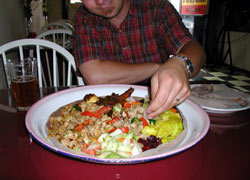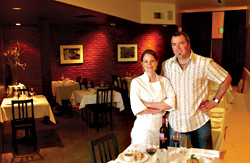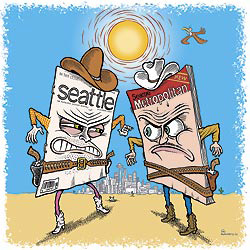The basics of Ethiopian food— the spongy, sour flatbread called injera; a spice mixture called berbere; various vegetable and meat stews; and the country’s famous coffee—are a cultural lifeline for Ethiopians in America. Sabrina Asress, who works at her mother’s catering company in Federal Way, was born in Ethiopia, and she considers herself Eritrean. (Eritrea declared independence just a decade ago.) Still, she says, the two cultures share many customs, including those concerned with dining. “I think for Ethiopians and Eritreans, when they go to their restaurants, in addition to the food, it’s a reason to get together,” she told me. “[It’s] an opportunity to affirm your identity. Because we’re in a country that’s not our own.”
Sometimes, at Saba Ethiopian Restaurant in Yesler Terrace, the only sound you hear is that of quiet conversation—possibly in Amharic, Ethiopia’s official language. A few minutes after you arrive, the stereo system might start blasting an African pop ballad; before the music kicks in, though, the place feels timeless.
According to Aster Teklegiorgis, the daughter of Saba’s current owner, her family’s acquisition of the restaurant was a case of loyalty rewarded. “There was a lady that owned it before, and me, my mom, and my brother and sister came here to eat,” she said recently. “And then when we sat here, we were like, ‘We could own this place!'” Their dream came true four years ago: When the eatery’s previous owner decided to sell, she gave the Teklegiorgis family a call. Aster’s mother was visiting her native Ethiopia at the time; when she returned, she signed the lease and became a restaurateur.
Aster, who works at the restaurant and bartends at the downtown Hilton, told me that the secret to finding good lentils in Seattle is browsing Indian food stores— the same ones Indian restaurants use. Coming up with Ethiopian spices, though, takes legwork. “My mom gets them from Ethiopia,” Aster said. Enough to last the restaurant for months? “Yes, they brought maybe 10 luggages before. They bring a lot. ‘Cause we make everything from scratch here.”
Many Ethiopian dishes derive their sweet-hot flavor from berbere, a blend of seasonings for which there appear to be a zillion recipes. A recent thread at Epicurious.com began when the site posted a makeshift formula for berbere, which included 13 separate spices (including fenugreek, ginger, cardamom, nutmeg, and allspice) but no berbere peppers. Respondents challenged the recipe’s authenticity (“the real deal” requires those peppers, one user harrumphed), debated its desired consistency, and even suggested it as a breakfast food.
When you taste wot stews across town, you realize that great berbere is the linchpin of successful Ethiopian cooking. The Central District’s Meskel (see sidebar below) makes a fine doro wot with chicken, a boiled egg, and house-made cheese, imbuing its berbere-based sauce with all the complexity of good Mexican mole. And nothing cuts the richness and heat of Ethiopian seasonings like sweet, light honey wine (tej) or Ethiopian beer (Harar is the brand to look for).
Saba’s menu covers the major stations of Ethiopian cuisine: chicken, beef, and lamb dishes (most of them $8.50 per entrée) in addition to the traditional vegetable preparations ($7 apiece). These include misser wot, or lentil stew (which delivers the smoky tang of good barbecue sauce, albeit with a hint of ginger); kik wot (split peas); and two lighter choices, gomen (collard greens) and tikil gomen (cabbage).
The stews—rich, dense dollops, aggressively seasoned—bring to mind the hearty curries of Indian cuisine, but the correct method for eating them is unique: scooping them up with pieces of spongy, sour flatbread (injera), torn from a face-sized pancake of the stuff. One piece of injera always lies beneath the stews, so that the spicy juices of each can soak in, commingle, and make that last bit of flatbread the best thing the meal has to offer. Eating the “tablecloth” piece signals the end of the meal, which, in turn, means the traditional coffee ceremony can commence.
Though it doesn’t offer the coffee ceremony (Columbia City’s Fasica is one place to find it; see sidebar), Saba clearly upholds the core value of Ethiopian cooking—above all else, appreciation of the food and of the guests you’re serving it to. As Sabrina Asress noted: “When you go to somebody’s house, it’s a sign of respect when you—whatever you have, even if it’s in the countryside, even if you’re not rich or whatever—you bring out whatever is the best, and you present it.” Even if you have to travel 8,365 miles just to pick it up from the market.
Saba Ethiopian Restaurant, 110 12th Ave., 206-328-2290, YESLER TERRACE. 9 a.m.– midnight Mon.–Thurs.; 9 a.m.–2 a.m. Fri.–Sun.








